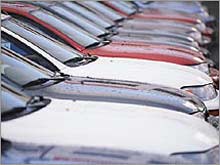Clinton bargains for better fuel economyPresidential hopeful Hillary Rodham Clinton makes campaign offer to Detroit automakers: tougher fuel economy standards in exchange for health care aid.DETROIT (Reuters) -- U.S. Sen. Hillary Rodham Clinton Saturday offered a double-barreled campaign message for the struggling U.S. auto industry: accept tougher fuel economy standards in exchange for federal help with the costly burden of retiree health care. Speaking at a union hall, Clinton also pledged new U.S. government investment in technologies that promise sharp gains in engine efficiency, such as lithium-ion batteries, an area where Japanese suppliers lead the pack.  "I know we have to do more to support the American auto industry and to support the American auto worker," she said. Clinton's speech before a loud and supportive crowd of several hundred mostly AFL-CIO members marked a contrast in tone on the ailing U.S. auto industry from Sen. Barack Obama, Clinton's leading challenger for the Democratic nomination. Obama said in a Detroit appearance last month that the U.S. automakers had not moved fast enough to answer the rising demand for more fuel efficient cars, remarks that rankled both Michigan politicians and industry leaders. In what she called a "win-win" policy prescription for Detroit, Clinton advocated reducing average fuel consumption and shoring up the payroll of an industry that has lost over 150,000 jobs in the past three years. She repeated her backing for stricter U.S. fuel economy standards in pending legislation aimed at the heart of the still truck-heavy lineup offered by Detroit automakers. General Motors Corp. (Charts, Fortune 500), Ford Motor Co. (Charts, Fortune 500) and Chrysler Group have lobbied to slow the proposed increases in fuel economy standards. The U.S. Senate is expected to take up a bill that would require raising average fleet fuel economy to 35 miles per gallon by 2020, up from about 25 miles per gallon currently. The bill would also mandate 4 percent annual increases in corporate average fuel economy, or CAFE standards, after that. Detroit automakers have countered that the proposal would cost jobs and force them to build smaller vehicles that American drivers have been unwilling to buy. Clinton said the U.S. automakers would have to accept the changes, but said in exchange the government could also help offset the retiree health care costs seen as the ailing industry's single biggest liability. In talks set to begin next month with the United Auto Workers union, the three automakers have said they will press for deep concessions in benefits, including health care. Taken together, the automakers carry about $91 billion in unfunded retiree health care and life insurance claims and spend some $12 billion on health care each year. Clinton said negotiating health care should not be the UAW's responsibility, saying she favored steps that would "lift some legacy costs from the auto industry." She did not specify how that government guarantee could be structured or funded. One idea being considered by all three Detroit automakers would shift the burden of retiree health care to a trust fund controlled by the UAW in exchange for a one-time payment, similar to a a deal struck by Goodyear Tire & Rubber Co. (Charts, Fortune 500) with its union. |
Sponsors
|
